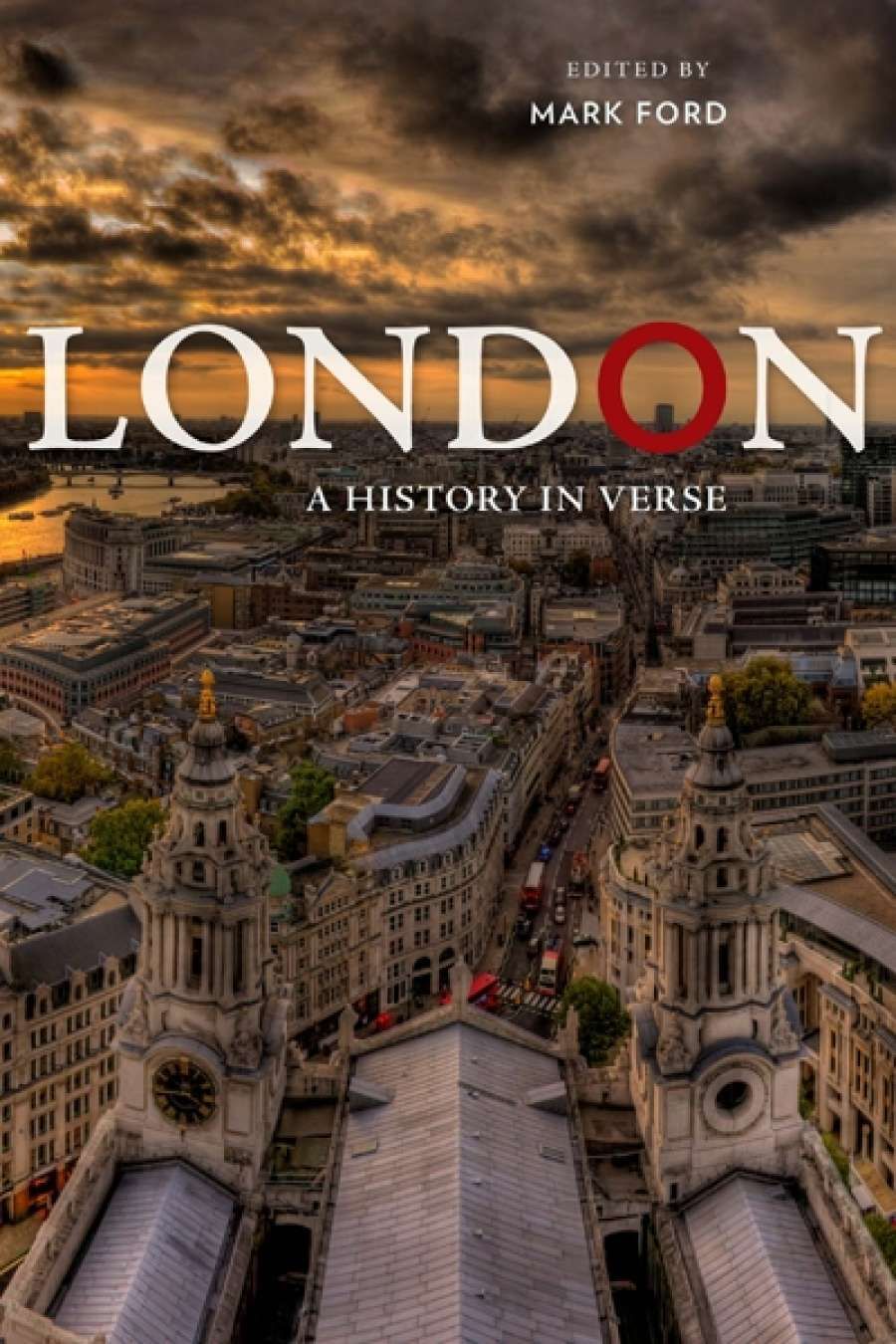
- Free Article: No
- Contents Category: Anthology
- Custom Article Title: Geoffrey Lehmann on 'London: A History in Verse'
- Review Article: Yes
- Online Only: No
- Custom Highlight Text:
For the poet W.S. Graham, running away from Scotland ‘with my money belt of Northern ice’ at the age of nineteen, London was the ‘golden city’ in his poem ‘The Night City’. Graham ‘found Eliot and he said yes // And sprang into a Holmes cab. / Boswell passed me in the fog / Going to visit Whistler who / Was with John Donne …’ For other poets in this anthology, London is a ‘noisome sewer’, as Cowper tells us in an extract from his long poem ‘The Task’. John Wilmot, earl of Rochester, after a night of wine and ‘grave discourse / Of who fucks who, and who does worse’, goes out into the cool of St James’s Park to find among the trees ‘nightly now beneath their shade / Are buggeries, rapes, and incests made’, and that there is a great congress of sexual activity of all walks of London life.
- Book 1 Title: London
- Book 1 Subtitle: A History in Verse
- Book 1 Biblio: Harvard University Press (Inbooks), $49.95 pb, 745 pp, 9780674065680
I am partial to poets who see a ‘golden city’. Wordsworth’s sonnet ‘Composed Upon Westminster Bridge, September 3, 1802’ has a vision of London early in the morning ‘All bright and glittering in the smokeless air’, which still excites more than two centuries later. What is admirable is Wordsworth’s openness of mind, his almost heretical standpoint: a cityscape can be as beautiful as a view over Lake Windermere. A long extract from ‘The Prelude’ shows a similar openness and curiosity, as the poet remembers his younger self in London streets rejoicing in ‘the great tide of human life’ and saying to himself: ‘The face of everyone / That passes by me is a mystery!’
T.S. Eliot’s ‘The Waste Land’, another famous London poem, is generously extracted. Eliot is not one of the London-is-a-noisome-sewer poets. His London is a noisome sewer and a golden city. After the seduction of the typist, observed and related by Tiresias’s ‘old man with wrinkled dugs’, with its celebrated finale of ‘She smoothes her hair with automatic hand, / And puts a record on the gramophone’, there is a remarkable shift of key to ‘O City, city, I can sometimes hear / Beside a public bar in Lower Thames Street, / The pleasant whining of a mandoline / And a clatter and chatter from within / Where fishermen lounge at noon: where the walls / Of Magnus Martyr hold / Inexplicable splendour of Ionian white and gold.’ Eliot’s invocation of ‘Unreal City / Under the brown fog of a winter noon’ is ambivalently beautiful, and has an openness and freedom that began to close up only three years later with his ‘The Hollow Men’.
The Nairobi-born editor of London: A History in Verse, Mark Ford, is a poet and professor of English at University College London. His anthology, ranging from the mid-fourteenth-century poems of John Gower and William Langland to a poem of Ahren Warner (b. 1986), and across all genres (love poems, satires, anonymous ballads, street cries, limericks, personal memoirs) and all styles (free verse to sonnets and villanelles – Wendy Cope has a beauty), displays an openness of mind and a keen eye. With a few exceptions, Ford has chosen poems for their merit as poems, rather than as ‘history’. However, reading the anthology consecutively, recurring themes emerge.
Thomas Wyatt, briefly incarcerated in the Tower during the reign of Henry VIII, writes of an execution, presumably that of his friend and rumoured lover Anne Boleyn:
The bell tower showèd me such sight
That in my head sticks day and night.
There did I learn out of a grate,
For all favour, glory, or might,
That yet circa Regna tonat.
More than a century later, in ‘An Horatian Ode upon Cromwell’s Return from Ireland’, Marvel writes of the execution of Charles I, ‘While round the armèd bands / Did clap their bloody hands’:
He nothing common did or mean
Upon that memorable scene;
But with his keener eye
The axe’s edge did try:
Nor called the gods with vulgar spite
To vindicate his helpless right;
But bowed his comely head
Down as upon a bed.
More than two centuries later, Lionel Johnson writes memorably about a statue of Charles I at Charing Cross: ‘Alone he rides, alone, / The fair and fatal king: / Dark night is all his own …’ Then just a few pages later in ‘Hugh Selwyn Mauberley’, Ezra Pound tells us: ‘how Johnson (Lionel) died / By falling from a high stool in a pub …’
A personal favourite is Christopher Reid’s ‘North London Sonnet’ dedicated to his late wife, the actress Lucinda Gane: ‘A boom-box blats by / less music than sonic muscle’, which sets off the alarm of a parked car:
but that too soon quiets
and you sleep on, proof
against the rumpuses and riots
encircling our roof,
till switching off the light
prompts a muffled Good night.
London’s culture has been enriched by the influx of many other cultures. Another favourite poem is the Jamaican James Berry’s ‘Two Black Labourers on a London Building Site’:
Been a train crash.
Wha?
Yeh – tube crash.
Who the driver?
Not a black man.
Not a black man?
I check that firs.
Thank Almighty God.
Bout thirty people dead.
Thirty people dead?
Looks maybe more.
Maybe more?
Maybe more.
An black man didn drive?
No. Black man didn drive.


Comments powered by CComment